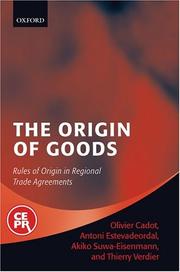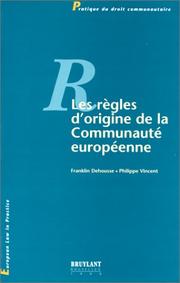Book
ISBN: 9786610903122 0191537373 1280903120 1435624068 Year: 2006 Publisher: Oxford ; New York : Oxford University Press,
Abstract | Keywords | Export | Availability | Bookmark
 Loading...
Loading...Choose an application
- Reference Manager
- EndNote
- RefWorks (Direct export to RefWorks)
The dark side of preferential trade agreements, Rules of Origin (RoO) are used to determine the eligibility of goods to preferential treatment. Ostensibly meant to prevent the trans-shipment of imported products across Free Trade Agreement borders after superficial screwdriver assembly, they act in reality as complex and opaque trade barriers. This book provides evidence strongly suggesting that they do so by intent rather than accidentally---in other words, that RoOs are policy. Part one draws insights about the effects of RoOs on cross-border trade and outsourcing from recent economic theory
Tariff. --- Certificates of origin. --- Tariff preferences. --- Commercial treaties. --- Regionalism.

ISBN: 0199290482 9780199290482 Year: 2006 Publisher: Oxford: Oxford university press,
Abstract | Keywords | Export | Availability | Bookmark
 Loading...
Loading...Choose an application
- Reference Manager
- EndNote
- RefWorks (Direct export to RefWorks)
Commercial law --- Tariff --- Certificates of origin --- Tariff preferences --- Commercial treaties --- Regionalism
Book
Year: 2004 Publisher: Washington, D.C.
Abstract | Keywords | Export | Availability | Bookmark
 Loading...
Loading...Choose an application
- Reference Manager
- EndNote
- RefWorks (Direct export to RefWorks)
Customs administration --- Imports --- Certificates of origin. --- Tariff on textile fabrics --- Tariff on clothing --- Evaluation. --- United States. --- Evaluation.
Book
ISBN: 9026810601 Year: 1979 Publisher: Deventer Kluwer
Abstract | Keywords | Export | Availability | Bookmark
 Loading...
Loading...Choose an application
- Reference Manager
- EndNote
- RefWorks (Direct export to RefWorks)
Certificates of origin --- Rules of origin --- Customs administration --- Marks of origin --- Tariff --- History of the Netherlands --- Biography: 1800-1999 --- anno 1300-1399 --- anno 1500-1799 --- anno 1400-1499 --- Origin, Certificates of --- Origin, Rules of
Book
ISBN: 9780521851909 9780511551949 9780521384407 0521384400 0521851904 9780511508141 051150814X 9780511500626 0511500629 0511551940 0511506384 9780511506383 1107196027 0511507488 9786612058271 1282058274 0511504241 0511508808 Year: 2009 Publisher: Cambridge ; New York : Cambridge University Press,
Abstract | Keywords | Export | Availability | Bookmark
 Loading...
Loading...Choose an application
- Reference Manager
- EndNote
- RefWorks (Direct export to RefWorks)
This book discusses the different aspects of the rules of origin with a multidisciplinary perspective. It offered the first overview on the status of the negotiations of non-preferential rules of origin under the WTO agreement on rules of origin after more than ten years of negotiations and the possible implications for other WTO agreements. This book deals extensively with preferential rules of origin, analyzing the experience of the United States and the EU in developing the NAFTA and Pan-European rules of origin. It also compares and discusses the parallel experiences of the major southern regional trade agreements and the ASEAN-China free trade area, as well as Comesa and SADC in their negotiations of the European partnership agreements (EPAs) with the EU. It discusses the evolution of the different sets of rules of origin, the technical options for drafting them, a methodology for drafting product-specific examples, and the implications.
International law --- Commercial law --- Certificates of origin. --- Customs administration --- Customs administration. --- Foreign trade regulation. --- Tariff --- Law and legislation. --- Certificates of origin --- Foreign trade regulation --- Law and legislation --- Customs regulations --- Tariff lists --- Tariff schedules --- Trade regulation --- Export and import controls --- Foreign trade control --- Import and export controls --- International trade --- International trade control --- International trade regulation --- Prohibited exports and imports --- Finance, Public --- Rules of origin --- Marks of origin --- Law --- Origin, Certificates of --- Origin, Rules of --- General and Others
Book
ISBN: 0471936502 Year: 1992 Publisher: London Chancery Law Publ.
Abstract | Keywords | Export | Availability | Bookmark
 Loading...
Loading...Choose an application
- Reference Manager
- EndNote
- RefWorks (Direct export to RefWorks)
Certificates of origin --- Tariff --- -351.82 EC --- Ad valorem tariff --- Border taxes --- Customs (Tariff) --- Customs duties --- Duties --- Fees, Import --- Import controls --- Import fees --- Tariff on raw materials --- Commercial policy --- Indirect taxation --- Revenue --- Customs administration --- Favored nation clause --- Non-tariff trade barriers --- Reciprocity (Commerce) --- Rules of origin --- Marks of origin --- Law and legislation --- -Economisch recht. Economische wetgeving. Economische reglementering. Subsidies voor het bedrijfsleven--EC --- Certificates of origin. --- 351.82 EC Economisch recht. Economische wetgeving. Economische reglementering. Subsidies voor het bedrijfsleven--EC --- Economisch recht. Economische wetgeving. Economische reglementering. Subsidies voor het bedrijfsleven--EC --- 351.82 EC --- Origin, Certificates of --- Origin, Rules of
Book
ISBN: 1316192032 131619020X 1316145123 110747244X Year: 2014 Publisher: Cambridge : Cambridge University Press,
Abstract | Keywords | Export | Availability | Bookmark
 Loading...
Loading...Choose an application
- Reference Manager
- EndNote
- RefWorks (Direct export to RefWorks)
Rules of Origin in ASEAN is the first in-depth exploration of the complex rules of origin in ASEAN's trade agreements. Written by two leading practitioners, it explains with clarity the existing ASEAN Rules of Origin (RoO) practices and their administration regimes in a comparative context and provide a recommendation for reform. The ASEAN RoOs can be simplified by imparting transparency and predictability to the legal drafting, focusing on a calculation method based on value of materials and lowering the regional value content required to qualify as ASEAN origin. The administration of ASEAN RoOs can be improved by expanding the use of self-certification, moving away from document-based verification to more modern post-entry audit and trade facilitation approaches. This is a timely and important topic which will be insightful to practitioners, policymakers and businesses in understanding how commerce and trade are conducted in Southeast Asia.
Certificates of origin --- Tariff --- Rules of origin --- Customs administration --- Marks of origin --- Ad valorem tariff --- Border taxes --- Customs (Tariff) --- Customs duties --- Duties --- Fees, Import --- Import controls --- Import fees --- Tariff on raw materials --- Commercial policy --- Indirect taxation --- Revenue --- Favored nation clause --- Non-tariff trade barriers --- Reciprocity (Commerce) --- Law and legislation --- ASEAN. --- Association of Southeast Asian nations --- Origin, Certificates of --- Origin, Rules of

ISBN: 2802712020 9782802712022 Year: 1999 Volume: *4 Publisher: Bruxelles: Bruylant,
Abstract | Keywords | Export | Availability | Bookmark
 Loading...
Loading...Choose an application
- Reference Manager
- EndNote
- RefWorks (Direct export to RefWorks)
Economic law --- European Union --- Certificaat van oorsprong --- Certificates of origin --- Certificats d'origine (Douanes) --- Droit européen --- Europees recht --- Trade regulation --- Commerce --- Réglementation --- Tariff --- Customs administration --- Law and legislation --- -Customs administration --- -Tariff --- -339.5 --- Ad valorem tariff --- Border taxes --- Customs (Tariff) --- Customs duties --- Duties --- Fees, Import --- Import controls --- Import fees --- Tariff on raw materials --- Commercial policy --- Indirect taxation --- Revenue --- Favored nation clause --- Non-tariff trade barriers --- Reciprocity (Commerce) --- Finance, Public --- Rules of origin --- Marks of origin --- -Law and legislation --- -European Union countries --- -EU countries --- Euroland --- Europe --- European Union countries --- Commercial policy. --- -Commercial policy --- Réglementation --- Union européenne --- Tariff preferences --- 339.5 --- Origin, Certificates of --- Origin, Rules of --- Certificates of origin - European Union countries. --- Tariff - Law and legislation - European Economic Community countries. --- Customs administration - Law and legislation - European Union countries.
Book
ISBN: 9020006258 Year: 1980 Publisher: Deventer Kluwer
Abstract | Keywords | Export | Availability | Bookmark
 Loading...
Loading...Choose an application
- Reference Manager
- EndNote
- RefWorks (Direct export to RefWorks)
Certificates of origin --- Marks of origin --- buitenlandse handel --- handelsrecht --- invoerrechten --- nederland --- 351.82 <492> --- Rules of origin --- Customs administration --- Tariff --- Geographical indications (Marks of origin) --- Origin, Marks of --- Identification --- 351.82 <492> Economisch recht. Economische wetgeving. Economische reglementering. Subsidies voor het bedrijfsleven--Nederland --- Economisch recht. Economische wetgeving. Economische reglementering. Subsidies voor het bedrijfsleven--Nederland --- commerce exterieur --- droit commercial --- droits de douane --- pays bas --- Trade theory --- Commercial law. Economic law (general) --- Origin, Certificates of --- Origin, Rules of
Book
ISBN: 1462316352 1452792402 1283511444 1451920091 9786613823892 Year: 2003 Publisher: Washington, D.C. : International Monetary Fund,
Abstract | Keywords | Export | Availability | Bookmark
 Loading...
Loading...Choose an application
- Reference Manager
- EndNote
- RefWorks (Direct export to RefWorks)
Incorporating intermediate inputs into a small-union general-equilibrium model, this paper first develops the welfare economics of preferential trading under the rules of origin (ROO) and then demonstrates that the ROO could improve the political viability of Free Trade Agreements (FTAs). Two interesting outcomes are derived. First, a welfare reducing FTA that was rejected in the absence of the ROO becomes feasible in the presence of these rules. Second, a welfare improving FTA that was rejected in the absence of the ROO is endorsed in their presence, but upon endorsement it becomes welfare inferior relative to the status quo.
Customs unions. --- Certificates of origin. --- Free trade --- Free trade and protection --- Trade, Free --- Trade liberalization --- International trade --- Rules of origin --- Customs administration --- Marks of origin --- Tariff --- Free trade areas --- Tariff unions --- Commercial policy --- International economic integration --- Second best, Theory of --- Econometric models. --- Origin, Certificates of --- Origin, Rules of --- Exports and Imports --- Taxation --- Trade: General --- Trade Policy --- International Trade Organizations --- Retail and Wholesale Trade --- e-Commerce --- Public finance & taxation --- International economics --- Tariffs --- Imports --- Exports --- Trade in goods --- Taxes --- Balance of trade --- Mexico --- E-Commerce

 Search
Search Feedback
Feedback About UniCat
About UniCat  Help
Help News
News